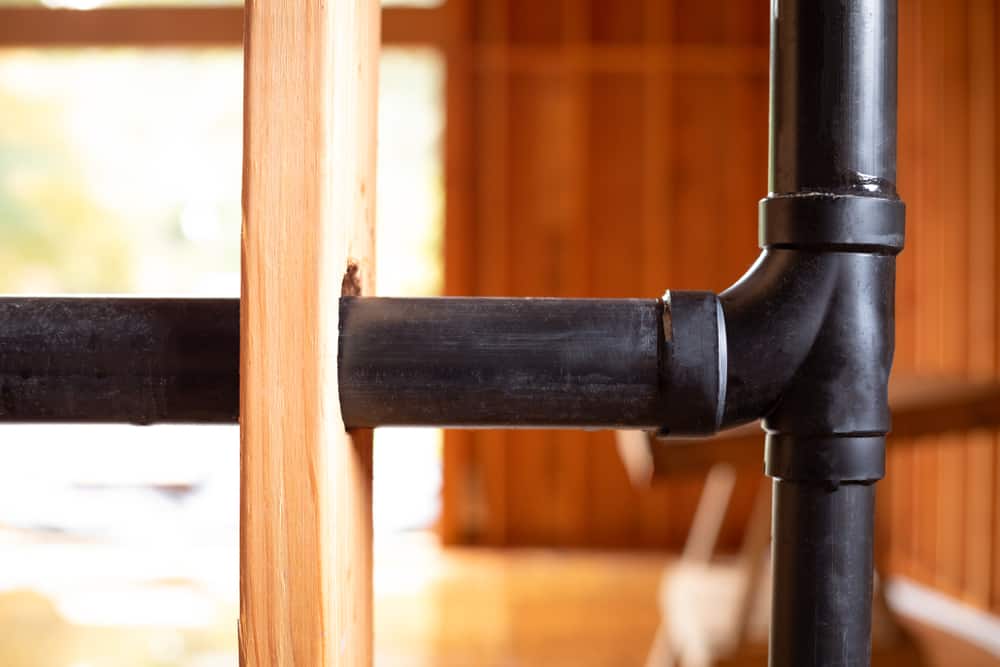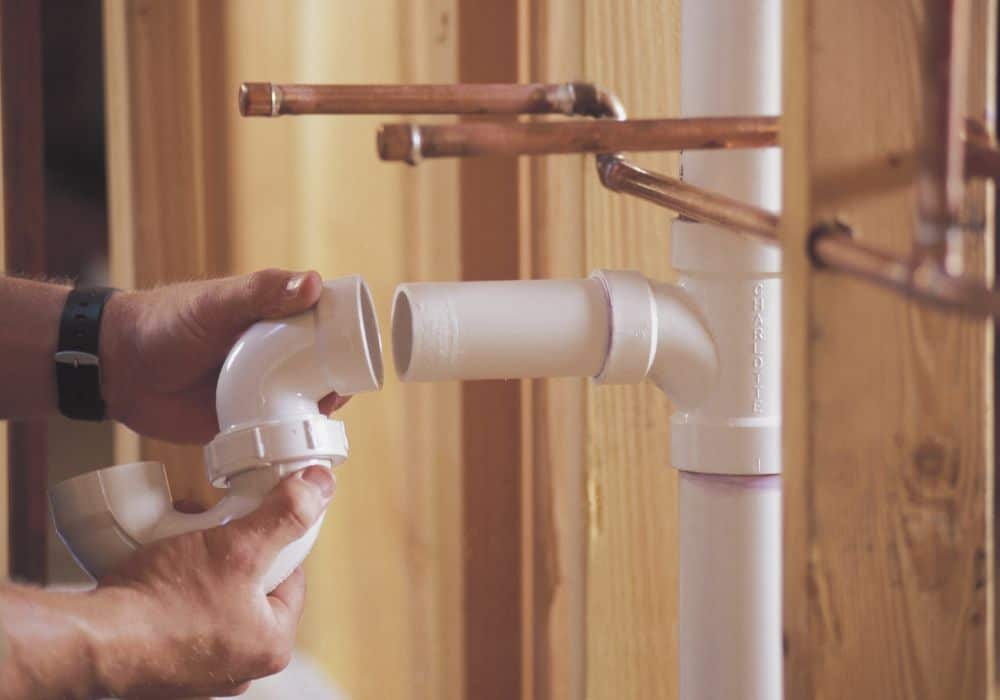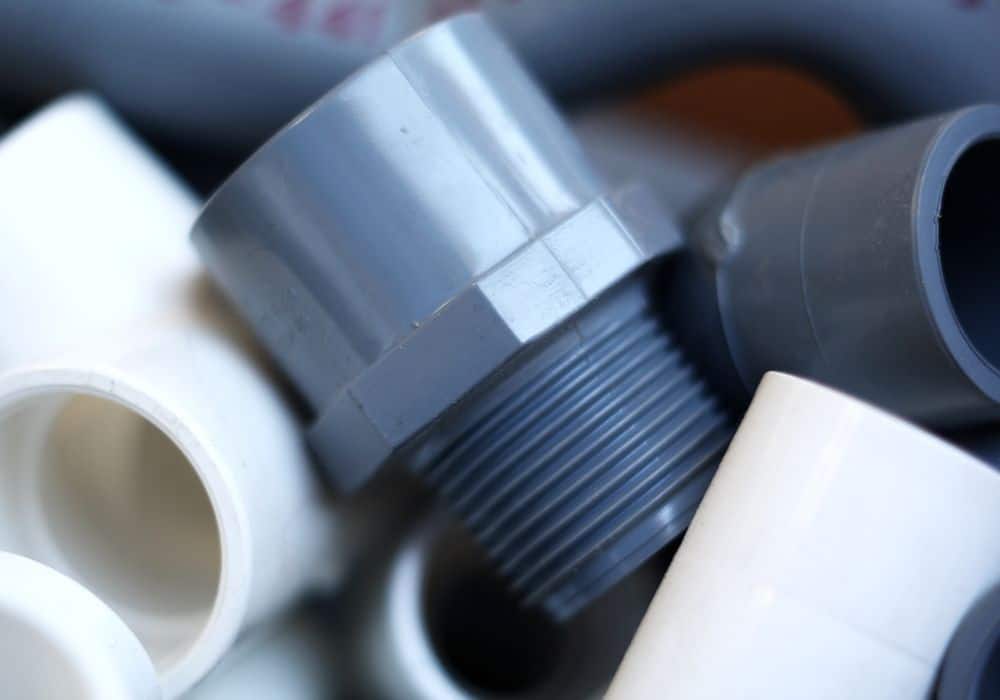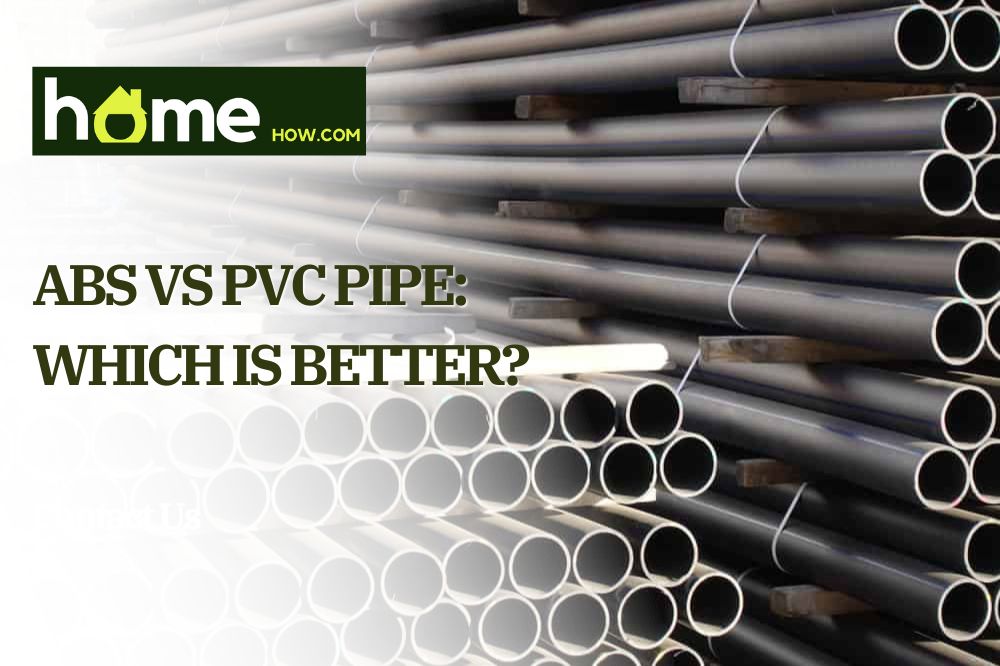There are many different types of plastic pipes on the market in recent years but two stand out with their versatility and usefulness – ABS and PVC pipes.
How do the two compare to one another and to metal pipes, however, which type of pipe is better for you, and what else do you need to know about them? To find out, we’ve compiled a quick but extensive ABS vs PVC pipe comparison below.
What is an ABS pipe?
ABS or Acrylonitrile Butadiene Styrene pipes are one of the two most common types of plastic pipes in construction and plumbing today.
They are made out of extra durable plastic, and are often used by plumbers and construction workers for cold water in high elevations, for drain or sewage purposes, as a vent pipe, for areas at risk of higher shock or corrosion, and so on. Let’s see some of its benefits and drawbacks first.

ABS pipe benefits
- Made out of extra durable plastic, ABS pipe is very shock resistant, difficult to bend, and also does great in cold temperatures – more so than not only PVC pipes but also most types of metal pipes that tend to be vulnerable to condensation and cracking.
- With an ABS pipe, the risk of a leak is almost non-existent with the right maintenance and the life expectancy is similar to that of most metal pipes – around 50 years.
- The fact that ABS pipes are very easy to install is another big benefit. Unlike metal pipes that often need lots of work on their joints and even unlike PVC pipes, installing and joining ABS is really just a simple one-step process. That’s because all ABS pipes need is a special cement that allows them to easily and securely join under any angle and in any environment.
- That ABS pipe cement is also quite affordable as are the ABS pipes themselves, at least in most areas. This makes ABS pipe installations and repairs both easy and budget-friendly.
ABS pipe drawbacks to keep in mind
As great as they are, ABS pipes have their disadvantages too which is why they are not the only major option out there and why PVC and metal types are often chosen over them. Here are the two main things to note:
- ABS pipes are made with BPA (Bisphenol A). Not everyone considers this a major drawback as BPA is seen as “acceptable at current levels” by the Federal Drug Administration.
It is a highly controversial chemical, however, with many animal studies showing BPA-related hormonal, neurological, cardiological, and other issues. For many people, especially homeowners, this is reason enough to avoid ABS pipes for residential use or to at least limit them to sewage and waste plumbing.
That’s also why your local government might have restricted the use of ABS pipes in your area. - Direct sunlight is also an issue for ABS pipes as they don’t handle heat as well as PVC pipes. So, while ABS pipes are usually preferred for colder temperatures and conditions, they really should be avoided for exposed above-ground areas in direct sunlight or in warmer climates.
Aside from these two major drawbacks, ABS pipes really have a lot going for them. To determine if there are some other minor cons to consider, let’s look at their main alternative first – PVC pipes.
What is a PVC pipe?
Poly Vinyl Chloride or PVC pipes for short are probably the most well-known non-metal pipes in use today. Also, it has its own pros and cons.

PVC pipe benefits
- Durable, flexible, lightweight, long-lasting, and easy to use, PVC pipes are used for drainage, hot water, wastewater in sewers, and for electrical insulations all across the world.
- PVC pipes are also much more soundproof than both ABS pipes and metal pipes which makes them fantastic for indoor use as they block the sound of water. PVC is also much easier to bend than the rigid ABS plastic so PVC pipes are significantly easier to lay down around corners and in other tricky areas.
- PVC also lacks BPA or other controversial and potentially harmful chemicals in it. This is a big reason why a lot of people prefer PVC over ABS for residential use and for drinkable water in particular.
- Another major benefit here is the fact that PVC pipes aren’t at all as vulnerable to heat and direct sunlight as ABS pipes. So, if you need your piping to run above ground or in hot areas, PVC is definitely the way to go.
PVC pipe drawbacks to consider
All those benefits don’t mean that PVC is always the better choice and there are indeed a few clear-cut drawbacks of these plastic pipes compared to ABS or metal piping:
- Connecting PVC pipes is a two-step process compared to the much quicker one-step process with ABS pipes. That’s because PVC pipes also require a special purple primer to be applied before the connecting cement.
This can sound like a minor drawback and it technically is – PVC pipes are still easier to connect than most other metal alternatives. However, in a direct comparison with ABS pipes, it ought to be said that the latter are easier to work with.
If you only have one or two pipes to lay down you won’t feel the difference but if you have lots of piping to deal with, the difference in both monetary and work investments will become noticeable. - PVC pipes are also not as rigid and shock-resistant as ABS pipes. This con is usually seen as worth it as that’s also why PVC pipes are easier to bend and more flexible. And, in general, they are still considered more than durable enough for most situations. Yet, if durability to external shock is a must, ABS pipes would be more secure.
- PVC is also not as cold-resistant as ABS piping. This trade-off is pretty clear-cut as PVC does better under sunlight and heat. So, very often, the choice between the two types of piping depends almost entirely on the temperatures you expect in your area.
ABS vs PVC pipe comparison
With the major properties and occasional disadvantages of both types of piping, let’s see how ABS vs PVC pipes compare:
1. Temperature and environment
The biggest difference between ABS and PVC pipes is in the temperatures and environmental exposure they can handle. ABS pipes do better in cold as they can operate safely in temperatures as low as -40°F whereas PVC pipes start to freeze when the temperature drops below 20°F.
The higher temperature tolerance of both is pretty similar – around 140°F – but PVC is often chosen over ABS in areas with ample sunlight and surface heat as ABS pipes don’t handle direct sunlight well.
2. Flexibility
Flexibility is one of the main advantages of PVC piping over ABS while the latter shines with its greater shock resistance. So, when you need piping that’s extra resistant to physical stress, ABS is the way to go but PVC is better if you need piping that’s easier to bend and curve when necessary.
3. connecting process
The connecting process is another major difference with the age here going for ABS. Because PVC pipes require an additional component for connecting, the process there becomes more complicated and costly, albeit not by much. Nevertheless, if you have lots of pipes to install, this becomes significant.
4. Price
Price-wise, ABS and PVC pipes are very comparable. The need for a primer when connecting PVC pipes can bump their price a bit but overall the main factor in the pricing comes from logistics – ABS pipes are more expensive in some areas and PVC, in others.
5. Environmental friendly
Another difference is the presence of BPA in ABS pipes. If that bothers you, it’s best to go for PVC and restrict ABS pipes to wastewater only.
Additionally, keep in mind that connecting PVC and ABS pipes together is ill-advised. So, if your installation already has one or the other, it’s better to just keep going with the type you already have.

Lastly, don’t forget that the first step before choosing between ABS and PVC pipes should be to just check your local building codes. Chances are that there are certain local regulations put in place by your local government regarding the use of ABS and PVC piping by both homeowners and professional plumbing services.
In many cases, the choice might have been made for you in such plumbing codes, and reading a comparison article might end up being pointless. So, before looking for recommendations, always check local regulations first.
In conclusion – should you get an ABS or a PVC pipe?
As you can see, there is a reason why builders and homeowners alike often gravitate toward ABS and PVC pipes. The lightweight nature, ease of use, affordability, and flexibility of these plastic pipes make them ideal for many types of construction and plumbing projects.
As similar as ABS and PVC pipes are, however, there are quite a few very key differences between them such as the cold resistance and vulnerability to sun exposure of ABS pipes, the more complex connection process of PVC pipes, the presence of the BPA chemical in ABS pipes, and others. Such differences and disadvantages are crucial when picking the right material for your home or project.
